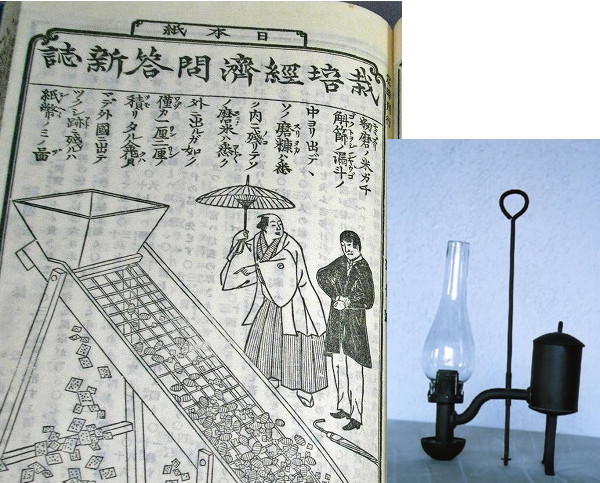Lamps: The Ruin of the Nation 「ランプ亡国論」の真実
邦訳は以下である。

You may be familiar with Jun’ichirō Tanizaki’s essay In Praise of Shadows (1933). But were you aware that Tanizaki had a predecessor in the form of a Meiji period crank? I think not! Kaiseki Sata was a Shin Buddhist monk who published a ferocious series of essays in the 1870s, on topics such as “On the Uselessness of Bookkeeping and Ink”, “On Boycotting the Solar Calendar”, “On the Four Dangers of Western-Style Umbrellas”, “On the Great Dangers of Milk”, “On Railways: The Ruin of the Nation”, and everyone’s favorite, “A Caution Against Lamps: The Ruin of the Nation” (1880).
I was unable to find any information about the majority of these essays, but the logic of “Lamps: The Ruin of the Nation” is actually not bad. Sata warns his readers that to light Western-style lamps you need kerosene, but Japan’s only oil fields are in Niigata, and would be depleted within 50 years (1930). If Japan becomes addicted to lamps and exhausts the Niigata fields, they will have to trade their reserve funds for oil until they have no more funds, and the nation will be ruined quod erat demonstratum. The argument is basically that oil is a non-renewable resource, and is therefore not backwards but remarkably foresighted.
“The West became civilized in the Western way,” said Kata, “and Japan will become civilized the Japanese way.” He had no desire to plunge Japan into darkness. Instead, he invented himself a lamp that ran on vegetable oil, to which he gave the suitably native name kankōtō (pictured above; source). He also advocated for Japanese lamps, andon, which ran on fish oil.
Sata only neglected to recognize that Japan could not defend its independence from the oil-powered Western nations without finding some oil of its own. Running steamships and tanks on vegetable oil would have been quite sustainable, but not politically viable. Indeed, the military use of oil was a principal motivation behind imperialism and World War II.
Again, none of the other essays are available online, so I don’t know what the dangers of Western-style umbrellas were, but at least some of them are apparently collected in a journal he ran (also pictured above). Or you can read “Bread: The Ruin of the Nation”, by an unrelated author, at the National Diet Library site. Learn why bread will cause Japan’s physical, spiritual, and economic ruin! If only we had listened…
(Japanese translation)
谷崎潤一郎の「陰翳礼讃」はご存知かもしれないけど、陰翳が好きだった先人はもちろん明治にもいた。それは佐田介石という真宗の坊主で、明治初期に激しい文明開化批難の投稿を次々に発表した。「簿記インキ無用論」「牛乳大害論」「蝙蝠傘四害論」「太陽暦排斥論」「鉄道亡国論」そして佐田の声望を高からしめた「ランプ亡国の戒め」である。
これらの記事の殆どは今では手に入らないが、唯一手に入る「ランプ亡国の戒め」を読むと、非常に論理的である。当時、日本の油田は越後にしか存在しなかったため、50年後(西暦1930年)に国産石油がなくなって、ランプの石油に補助金を出さないといけないようになるから、亡国になるという戒めである。石油は枯渇性資源というわけで、実は時代遅れの亡国論じゃなくて、驚くべき先見の明である。
「西洋には西洋の文明開化あり、我が日本には日本の文明開化あり」と語った佐田にとっては、日本を真っ暗にするわけにはいかなかった。代わりに、菜種油を使う「観光灯」を発明した(写真上)。国産の魚油を使う行灯も支持した。
そんな佐田だったが、かれが唯一が予言できなかったのは、大量の石油を持つ西洋に対して日本の独立を守るため石油の発見が日本にとっては必須だったことである。菜種油エンジンの戦艦か戦車はエコな夢だけど、政治的に実現が不可能である。満州事変や太平洋戦争の原点はこれである。
繰り返しになるが佐田の他の投稿はネットに載っていないから、蝙蝠傘の四害は分からないが、一部の投稿が「栽培経済問答新誌」という雑誌に集められたようである。或は、佐田とは全く無関係の作家によるものではあるが、同じく明治期の文明開化批難の言論として、「食パン亡国論」を国会図書デジタルライブラリーで読むことができる。これには、「肉体、精神、経済」上の亡国が書いてあって、ご飯が完全な主食だった過去の時代を懐かしがっている…
Posted: February 28th, 2014 | Japan, Signs of the Times 2 Comments »
